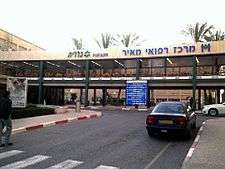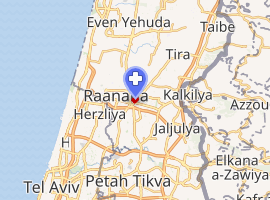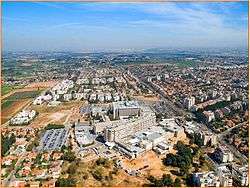Meir Hospital
Meir Medical Center (Hebrew: מרכז רפואי מאיר, Merkaz Refu'i Me'ir) is a hospital in Kfar Saba, Israel. It is the seventh largest hospital complex in the country,[1] and is part of a network of hospitals owned and operated by Clalit Health Services.
| Meir Hospital | |
|---|---|
 | |

| |
| Geography | |
| Location | Kfar Saba, Israel |
| Coordinates | 32°10′54.94″N 34°53′45.06″E |
| Organisation | |
| Type | General |
| Services | |
| Beds | 717 |
| History | |
| Opened | July 15, 1956 |
| Links | |
| Lists | Hospitals in Israel |
History

The medical facility in Kfar Saba was opened to the public on July 15, 1956, as a hospital for Tuberculosis and diseases of the respiratory system.[2] Later in 1962, Meir was turned into a general hospital and is now part of the Sapir Medical Center.[3] Clalit Health Services (formerly known as Kupat Holim Clalit) built the original hospital thanks to the pivotal influence of Dr. Alfred Grünebaum.[4]
Meir Hospital serves the ethnically diverse communities of the highly-populated eastern Sharon plain, including Israeli Arab patients from the Triangle towns and villages. The hospital is named after Dr. Josef Meir (1890–1955), the first head of Kupat Holim Clalit and director of the ministry of health of pre-state Israel. Meir was a strong opponent of the elitist private health care then prevailing and stated that medicine should be organized as an equal public service aimed at improving health levels of the population at large.[2] Today, when Meir Hospital medical staff is called upon to save life, it does not discriminate between religion, race or sex, admitting patients from the cross border Palestinian Authority city of Qalqilyah.[5]
Services
Meir Hospital teaching departments are affiliated with the Sackler School of Medicine, Tel Aviv University, while laboratories are affiliated to Bar Ilan University.[6] Meir Medical Center specializes in the treatment of pulmonary diseases and spinal surgery and is accredited under the JCI. It is the base hospital for the Israeli Olympic team.[7]
- 717 beds for hospitalization
- 60 seats in the outpatient clinic
- 57 seats for admission to hospital births
- 28 sites to undergo dialysis
- 122 clinics[8]
Institutes
See also
- Health care in Israel
References
- Ayala Hurwicz (2007-05-07). "Sheba - Largest Hospital in Israel" (in Hebrew). Retrieved 2007-09-14.
- Meir Medical Center: About Us >> History Archived June 18, 2011, at the Wayback Machine
- [http://www.clalit.co.il/he-il/english about clalit health services] Archived December 12, 2010, at the Wayback Machine]
- "Dr. med. Alfred Grünebaum". sites.google.com. Retrieved 2018-05-28.
- Meir Maternity Ward Staff Save 20 Year-Old Arab Mother
- Meir Hospital - Sapir Medical Center is on Facebook
- "Treatment in Israel. Meir Medical Center". Archived from the original on 2010-05-07. Retrieved 2010-07-07.
- "about clinic". Archived from the original on 2011-01-10. Retrieved 2010-07-08.
External links
| Wikimedia Commons has media related to Meir medical center. |